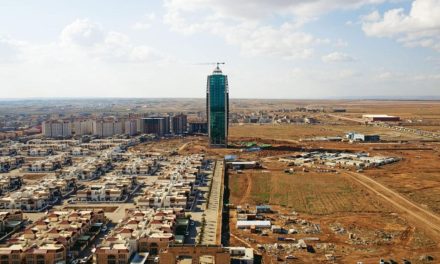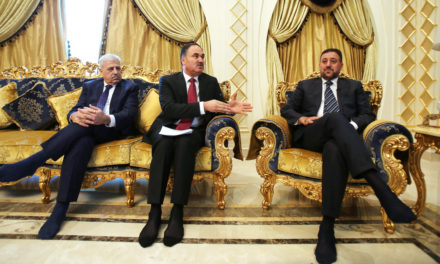The protests continue in many Arab and Asian countries, but most notably in Iraq and Lebanon. The protesters are demanding fundamental reforms in the structure and nature of the political system, providing better living conditions and jobs. In addition, these protests are accompanied by acts that negatively affect their legitimacy.
In Iraq, the wave of protests began to escalate at the beginning of October this year, accompanied by a curfew for several days in Baghdad, and the disconnection of Internet services throughout the country. This wave subsided before the annual Arbaeen pilgrimage. However, the wave of these protests erupted again on October 25 starting from the southern governorates and Baghdad. Violence escalated in several governorates, most notably in Muthanna and Dhi Qar, which witnessed the burning of the headquarters of several political parties and armed factions of Popular Mobilization Units (PMU). Many fear these events may lead to an internal armed conflict without reaching any results.
The results of these protests may leave us with new problems exposing the extent of the laxity and weaknesses of the government. These problems have contributed to the uncertainty of the situation at both governmental and societal levels.
Politically, observers believe that the current crisis in the country has proved the weakness in the exercise of the democratic system in Iraq, with the desire to find an alternative at the present time through a constitutional amendment, the demand to change the system of government in Iraq to a presidential one, the need to reduce the number of ministries full of disguised unemployment, and the abolition of provincial councils. The Parliament in its session on October 28 voted on a number of resolutions to calm the street, including “the abolition of the privileges of the three presidencies and ministers, deputies, the judiciary, the secretaries of ministries, general managers, and others with the same grade, and the dissolve of provincial councils, except for the Kurdistan Region“.
The current crisis has shown the failure of official bodies and how they are affected by political decisions as a result of the quota system. For example, the Ministry of Communications was unable to block social media sites without cutting the internet service completely. They managed to do it after conducting specific technological work that the Ministry lacked for the past 14 years.
The protests also showed the weakness of the government’s performance, and lack of leadership and management during the crisis. They also showed the fragmentation of the security decision and the conflict of powers between the formations of a single security ministry within its agencies, as well as the intersection of authority between them and other ministries. Also, there is the problem of weak decisions due to lack of leadership that can take brave and decisive actions. The protests have revealed the weak role of political and religious discourse which have not risen to the level of the current crisis. They took weak decisions, and decided to respond by cutting the Internet service, blocking roads, imposing a curfew, and isolating areas from each other with concrete blocks.
The political crisis has paralyzed the country and people’s lives, unlike true democratic countries, where differences are dealt with in civil manners in the halls of decision-making, unless there is a need to put pressure by asking supporters to protest in the streets. The protests have cast a shadow on the foreign policy file. Iraq did not “qualify it to maintain its seat on the Human Rights Council recently“. Some experts say this a result of recent violence that accompanied the protests in the country.
The political situation in Iraq is very complicated. Analysts and those who are close to the main political blocs in the country expressed their fears of the internal clash between political forces by taking advantage of the wave of protests to settle scores. The religious authority in its sermon on Friday, October 25 explained a number of points in which it pointed the need to “take care of public and private funds, avoid attacking government facilities and citizens’ properties, maintain the peacefulness of demonstrations to achieve legitimate demands, call on the security forces to preserve the lives of demonstrators, and be united”. This has indirectly legitimized the continuation of the protests to achieve the desired objectives, and prevent the outlaws and uncontrolled protesters from achieving their goals, which would lead to political and social divide between the people of Iraq.
Economic Impact
The recent situation in Iraq has created economic chaos in the markets. Many traders took advantage of people’s need for food and other goods and raised the prices. The protests also disrupted the movement of construction materials between provinces and within a province itself under the pretext of security reasons. This generated resentment and economic stagnation since the beginning of October. Protests led to further confusion for foreign and domestic companies in the country, as well as oil companies in the center and south of the country. The fear of disturbing the energy sector projects, not being able to meet the financial obligations to the companies investing in the energy sector, and paying the loans granted to Iraq by the International Export Agency has risen since the beginning of the protests. The protests also affected the field of education, especially the international schools operating in Iraq. The number of teachers and workers willing to work in these schools has declined.
Security and Social Impact
After the victories achieved by Iraqis in their war against Da’ish from 2014 until the declaration of victory in 2017, it is obvious that the confidence between the people and security forces have been restored after rebuilding the latter with the help of the international community. However, many political and security observers think this confidence may be shaken again after the tensions between protesters and security forces during the protests.
Moreover, the important question is who will be responsible for the dead and wounded among the protesters in different governorates? Who will bear the responsibility for this bloodshed? We know that Iraqi society is a tribal one and protesters and security forces have been in direct contact with each other. This may lead to the use of tribal pressure to act and exact revenge. For example, what happened in the city of Amara, where a leader of the PMU was murdered. His faction declared that it will hold the perpetrators accountable according to the law and avenge him. We potentially face a new wave of bloodshed, this time from people among the same nation.
The Results
The tensions that have affected the politics, the economy, and the security of the country may last for an uncertain amount of time. Protesters have many complex and different demands. The breakdown of agreements and alliances among the ruling parties may affect any future legislative or executive process aimed at creating constitutional amendments, provide services, change the nature of political alliances, create new electoral laws, or reopen old files such as balance in the state institutions, or restrict the possession of weapons to the State.
Things may go towards listening to the legitimate demands of the protesters and their implementation, which will lead to a degree of relative calm, or we might go towards the withdrawal of confidence from the government, dissolve the parliament itself, and call for early elections within 60 days, which may lead to decisive election results that form a government backed by the parliament. The current popular movement may contribute to the large participation of young people in the upcoming elections and may lead to constitutional amendments proposed by the parliament, which may change the political climate in the country completely. This will help in the emergence of new political forces aiming to reform the country.
The constitutional contexts outlined in Article 64 of the Constitution, “early elections require the President’s approval of a request from the Prime Minister to dissolve the Parliament and call for early elections within 60 days. The parliament will be dissolved only by getting the voices of an absolute majority of its members, 165 votes. The Government will then change into a caretaker Government.”
The transformation of the government to a caretaker government will lead to new problems, including a delay in passing the budget, stop legislating new projects and laws demanded by protesters, change the Independent High Electoral Commission and the election law, and cease the power of ministers to make ministerial decisions that affect the lives of citizens.
The pursuit of more legal and democratic mechanisms through constitutional, practical and realistic mechanisms may be one way out of the current crisis, which will contribute to building a new political climate that will contribute to the establishment of new parties to lead the process of change in the future.
Most importantly, Iraq has gone through more severe crises than these. These protests are a mean of legitimate democracy practiced by the people to express their opinion in a peaceful manner guaranteed by the Constitution.

Aymen Al-Faisal
Aymen Al-Faisal is a researcher and academic, with a special interest in Gulf political affairs; based in Baghdad.










